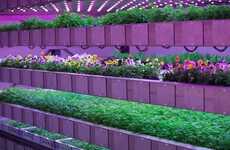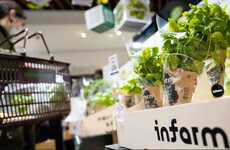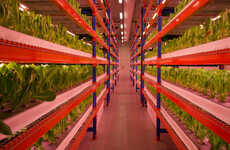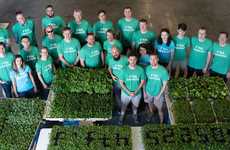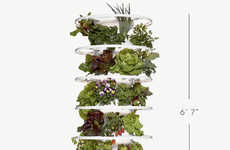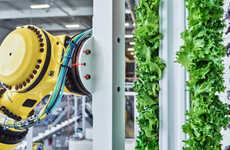
Vertical Fresh Farms is an Urban Farming Initiative in Buffalo
Rebecca Byers — April 10, 2015 — Lifestyle
References: verticalfreshfarms & wivb
Vertical Fresh Farms is a new urban farming business recently launched in Buffalo by two brother-in-laws. Matt Latham and Jeremy Witt have a plot of 250 romaine lettuce heads that they hope to continue expanding on.
Currently working to expand the operation to include more crops, Vertical Fresh Farms uses a system called Aquaponics. The sustainable grow process utilizes waste created by Koi fish as fertilizer. The 200 Koi fish sit in a tank underneath the plants, while the system uses approximately 98% less water than traditional farming methods.
This unique business venture is sure to influence the Buffalo foodie scene, while it is also a promising sign that vertical farming is continuing to spread in urban centers through the US. Vertical farming can be an immeasurable resource in areas designed as food deserts, while it also provides much needed jobs.
Currently working to expand the operation to include more crops, Vertical Fresh Farms uses a system called Aquaponics. The sustainable grow process utilizes waste created by Koi fish as fertilizer. The 200 Koi fish sit in a tank underneath the plants, while the system uses approximately 98% less water than traditional farming methods.
This unique business venture is sure to influence the Buffalo foodie scene, while it is also a promising sign that vertical farming is continuing to spread in urban centers through the US. Vertical farming can be an immeasurable resource in areas designed as food deserts, while it also provides much needed jobs.
Trend Themes
1. Urban Farming - Opportunity for businesses to adopt sustainable grow processes like Aquaponics to produce fresh produce in urban areas.
2. Vertical Farming - Growing trend of utilizing vertical spaces to maximize crop yields and conserve water in farming operations.
3. Food Deserts - Potential for businesses to address food scarcity in underserved areas through innovative farming techniques.
Industry Implications
1. Agriculture - Agricultural companies can explore vertical farming methods to increase crop production and minimize water usage.
2. Urban Development - Opportunity for urban planning and development organizations to incorporate vertical farming as a solution to food deserts in cities.
3. Restaurant and Food Service - Restaurants and food service businesses can diversify their supply chains by partnering with urban farming initiatives for locally sourced produce.
5.8
Score
Popularity
Activity
Freshness

